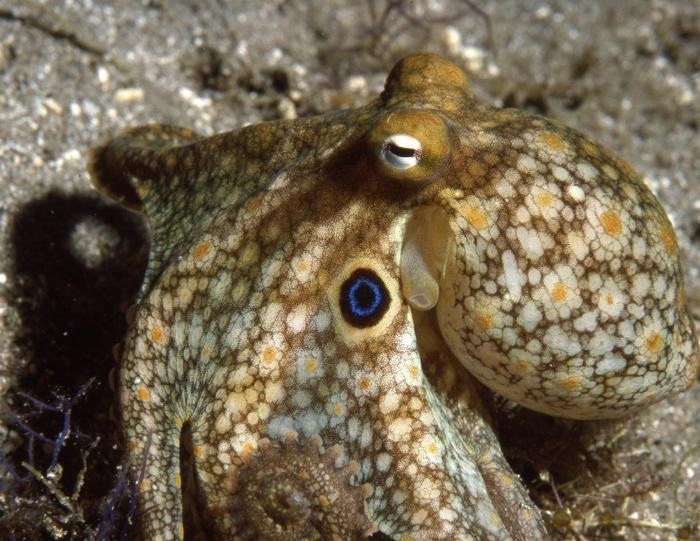Each cell has a finite set of instructions inscribed in its DNA. Life, on the other hand, is unpredictable, and when the situation changes, animals must adapt.
 Octopus bimaculoides. Image Credit: Roger T. Hanlon
Octopus bimaculoides. Image Credit: Roger T. Hanlon
According to the latest research guided by Joshua Rosenthal of the Marine Biological Laboratory (MBL) and Eli Eisenberg of Tel Aviv University, octopuses and their close relatives graciously adapt to environmental challenges by fiddling with their RNA—an intermediary molecule that conveys DNA’s instructions.
Rosenthal and co-workers reported a large increase in RNA editing when octopus, squid, and cuttlefish, termed coleoid cephalopods, acclimatize to cold water in a new study published in Cell on June 8th, 2023. The team observed increases in protein-altering activity at over 13,000 RNA sites in the octopuses’ nervous systems after cooling the tanks.
In two of these situations, they explored how changing a single letter in the RNA molecule’s code affects the function of proteins produced by neurons.
According to Rosenthal, a senior scientist at MBL, the cephalopods appear to have discovered a novel method of modifying their physiology through RNA editing.
We’re used to thinking all living things are pre-programmed from birth with a certain set of instructions. The idea the environment can influence that genetic information, as we’ve shown in cephalopods, is a new concept.”
Joshua Rosenthal, Marine Biological Laboratory
The Mystery of Massive RNA Editing in Cephalopods
The molecular machinery of a cell transcribes the instructions encoded in DNA into RNA, part of which is then translated into protein. Cells can switch one of the four-letter genetic code members, Adenosine, for a substitute molecule, Inosine, which operates similarly to Guanosine, one of the original four. While the same mechanism occurs in humans and most other species, it only impacts RNA that is bonded to create protein on a rare occasion.
Rosenthal and co-workers demonstrated in 2015 that squid use this type of protein-altering RNA editing (named A-to-I) on a large scale, and they later demonstrated the same in octopus.
“A big question for us was, ‘What are they using it for?’” Rosenthal notes.
Since editing affects RNA only temporarily, the researchers hypothesized that these organisms use it to adapt to their surroundings. They concentrated on the impact of one such component, temperature, on the nervous system in the current investigation.
Temperature is important because it regulates enzyme activity, which drives chemical reactions that are essential to all physiological functions.
The California two-spot octopus (Octopus bimaculoides) they examined, like other cephalopods, cannot create its body heat to adjust for temperature decreases caused by tides, changes in water depth, and seasons.
The scientists investigated the RNA of octopuses after acclimating them to temperatures at the warm end of their natural range (22 ºC/72 ºF) and the cool end (around 13 ºC/55 ºF). They tracked activity inside its molecular code at sites where they already knew modification occurred.
Researchers discovered significant increases at 13,285 sites where a one-letter alteration affects a protein in the octopuses in the cold tanks. They discovered upticks in 550 such places for those in the warm tanks.
Following research revealed that RNA editing may help animals adapt to slow changes, but not to quick ones, such as going from warmer surface water to cooler depths.
To support the laboratory findings, Matthew Birk, an assistant professor at Saint Francis University in Pennsylvania, recorded temperature readings near octopus dens in the winter and late summer, then collected the animals.
The researchers explored how RNA editing altered the activity of two proteins that are essential for neural function in octopuses, with assistance from collaborators at the University of Michigan and Texas Tech University.
Kinesin-1, the first protein, transports cargo along the long branches of neurons. They discovered that RNA editing alters the rate at which this molecule travels. It also changes the responsiveness of a protein called synaptotagmin, which allows neurons to communicate with one another.
One Secret to Cephalopods’ Sophistication?
Rosenthal believes that cephalopods employ this type of genetic tinkering to adapt to change in a variety of ways other than acclimating to cold water.
“I think it’s the tip of the iceberg,” he adds regarding the findings.
It may help to explain how these organisms have evolved sophisticated behavior. Octopuses, for instance, can solve mechanical puzzles and mimic colors and textures to camouflage. These capabilities necessitate nervous systems made up of a complicated set of proteins.
What mechanisms do they use to create this complexity? I believe that RNA editing is one of them.”
Joshua Rosenthal, Marine Biological Laboratory
Source:
Journal reference:
Birk, M. A., et al. (2023) Temperature-dependent RNA editing in octopus extensively recodes the neural proteome. Cell. doi.org/10.1016/j.cell.2023.05.004.